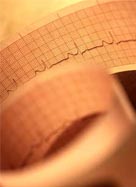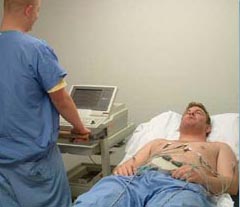Electrocardiogram (EKG/ECG)
Why is the doctor performing this test?
To evaluate the heart's function by viewing its electrical activity.
What is the test?
 An electrocardiogram (ECG or EKG) is a painless, non-invasive test whereby the doctor visualizes the electrical impulses of your heart. The technician will place a total of approximately 10 electrode patches on the skin of your arms, legs and chest (sometimes it is necessary to shave small areas of body hair in order to get a good reading). These electrode patches are hooked up to an electrocardiography machine which displays the electrical activity of your heart.
An electrocardiogram (ECG or EKG) is a painless, non-invasive test whereby the doctor visualizes the electrical impulses of your heart. The technician will place a total of approximately 10 electrode patches on the skin of your arms, legs and chest (sometimes it is necessary to shave small areas of body hair in order to get a good reading). These electrode patches are hooked up to an electrocardiography machine which displays the electrical activity of your heart.
This test can give your doctor the following information about the functioning of your heart:
- Heart attack: EKGs show whether you are currently having a heart attack or have had one in the past and can help differentiate between chest pain (angina) and a heart attack.
- Heart rate and rhythm: EKGs exhibit how fast or slow your heart is beating, and if the beats are regular or irregular.
- Heart structure: EKGs indicate the size and configuration of the heart, and possibly any defects you may have been born with.
 Where is the test performed?
Where is the test performed?
On the second floor of Sparrow Hospital in the cardiology department Heart Center or on the third floor of the St. Lawrence Campus.
How long does this test take?
Approximately 5 minutes.
How do I prepare for the procedure?
- There is no special preparation for this procedure.
- Wear a two piece outfit
- The test is safe and painless
Lie as still as possible during the test
Surgeries
- Abdominal Aortic Aneurysm Repair
- Bypass Surgery
- Carotid Endarterectomy (CEA)
- Coronary Artery Bypass Surgery (CABG)
- Transmyocardial Revascularization (TMR)
- Valve Repair Surgery
- Valve Replacement Surgery
Procedures
- Ablation
- Angiojet Thrombectomy
- Aortagram
- Atherectomy
- Automatic Implantable Cardioverter Defibrillators (AICD or ICD)
- Coil Embolization
- Computed Axial Tomography (CAT or CT)/Ultrafact Computed Tomography (CT) Scan
- Coronary Balloon Angioplasty & Stenting
- Coronary Catheterization
- Dobutamine Stress Echo
- Echocardiography (ECHO)
- Electrocardiogram (EKG/ECG)
- Electrophysiology Study (EPS)
- Event Recorder
- Holter Monitoring
- Inferior Vena Cava (IVC) Umbrella Placement
- Intraaortic Balloon Pump
- Intracardiac Ultrasound (ICE)
- Intravascular Ultrasound (ICE)
- Magnetic Resonance Imaging (MRI)/ Magnetic Resonance Angiography (MRA)
- Medicated Stents
- Nuclear Stress Tests
- Pacemakers
- Percutaneous Transluminal Angioplasty (PTA)
- Percutaneous Transluminal Coronary Angioplasty (PTCA)
- Peripheral Stents
- Peripheral Vascular Angiography
- Radiation Brachytherapy
- Septal Closures
- Signal Averaged Electrocardiogram (SAECG)
- Stents
- Stress Echocardiogram
- Stress Test
- Thrombolytic Treatment
- Tilt Table
- Transesophageal Echocardiogram (TEE)
- Valvuloplasty
